By Kaela Scott
Q: What kind of an impact do eating disorders have on finances?
A: This is a great question, and something that often comes up in my office at all different stages of the eating disorder journey. Mental illness can have a pretty big impact on our finances, and on our ability to manage our money in a way that boosts our financial confidence. Before I answer I just want to make it clear that I am not here to give financial advice – merely to help you understand the ways in which finances and eating disorders can be intertwined.
![]() I don’t think anyone can deny that having an eating disorder can have a significant effect on finances, and/or the mentality we have around money. For many people, their relationship with money can be an extension of the relationship they have with their eating disorder and with themselves. For example, those who restrict may struggle to spend money – even on things that are required for their recovery, like food, self-care activities, support, etc. For them, the fear of “too much” causes them to go without, even when doing so compromises their wellbeing. On the other hand, those who binge can be compulsive in their spending habits, and may purchase in excess because it feels soothing in that moment. For them, the fear of “going without” can feel incredibly overwhelming – even when the extra spending actually increases their overall suffering. Either way, shame and guilt about how we spend our money can feed our disordered thoughts and feelings and make it harder for us to find balance.
I don’t think anyone can deny that having an eating disorder can have a significant effect on finances, and/or the mentality we have around money. For many people, their relationship with money can be an extension of the relationship they have with their eating disorder and with themselves. For example, those who restrict may struggle to spend money – even on things that are required for their recovery, like food, self-care activities, support, etc. For them, the fear of “too much” causes them to go without, even when doing so compromises their wellbeing. On the other hand, those who binge can be compulsive in their spending habits, and may purchase in excess because it feels soothing in that moment. For them, the fear of “going without” can feel incredibly overwhelming – even when the extra spending actually increases their overall suffering. Either way, shame and guilt about how we spend our money can feed our disordered thoughts and feelings and make it harder for us to find balance.
When it comes to recovery, many of the supports we need (like therapy and meal support), cost money, which can easily increase anxiety around spending habits. While I am not recommending that you put yourself at financial risk, it is important to look at the supports you need to move forward and then work on regulating your anxiety around the financial implications. It is, for example, normal to have to spend money on food and to invest in nourishing yourself physically, mentally and emotionally. While this might feel difficult if you are used to restricting your purchases, food and otherwise, this investment is not just important, but critical, to your recovery. We can’t recover by continuing to inadequately nourish our bodies. The same can be true for those who are prone to overspending – by learning how to regulate your anxiety before and during shopping trips, you can avoid purchasing more than what you actually need or intended to buy.
Trying to recover from an eating disorder and simultaneously manage your finances in an often-expensive society is not always easy – but it can be learned.
It’s also important to remember that millions of people, of all ages, genders, and income levels, experience financial stress in their lives. You are not alone, and you are not any less of an adult if this is something you are struggling with. We all achieve competency through practice, and through being honest with ourselves about where our real difficulties lie. Trying to recover from an eating disorder and simultaneously manage your finances in an often-expensive society is not always easy – but it can be learned.
![]() What I typically recommend is to take some time to explore your own personal relationship with money, and ask for support when and where needed. Turning to people you trust or who could help you will move you towards greater security. This alone will help you feel more confident and less anxious. One of the most honest things you can do is write down what your relationship with money looks like, so you can see what is working well and what may be contributing negatively to your disorder and overall mental health. As you become more familiar with your habits, you can focus on continuing to strengthen your healthy habits while challenging the ones that are more destructive.
What I typically recommend is to take some time to explore your own personal relationship with money, and ask for support when and where needed. Turning to people you trust or who could help you will move you towards greater security. This alone will help you feel more confident and less anxious. One of the most honest things you can do is write down what your relationship with money looks like, so you can see what is working well and what may be contributing negatively to your disorder and overall mental health. As you become more familiar with your habits, you can focus on continuing to strengthen your healthy habits while challenging the ones that are more destructive.
Understanding your relationship with money is important; not only because it is one you will have for the rest of your life, but also because it can move you closer towards living a recovered and fulfilling life.
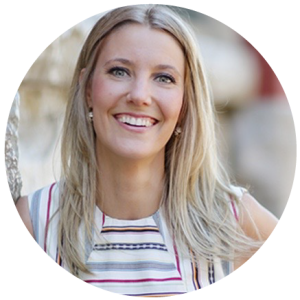 Kaela Scott is a Registered Clinical Counsellor who specializes in Eating Disorders. She runs her own private practice and works with the Looking Glass Foundation in both their summer camp and their Hand In Hand Program. She has been passionate about working with eating disorders since freeing herself from her own struggle and realizing what it is like to be happy and well. When she isn’t working, you can find Kaela either cozying up with a cup of tea and her friends or up in the mountains going for a hike.
Kaela Scott is a Registered Clinical Counsellor who specializes in Eating Disorders. She runs her own private practice and works with the Looking Glass Foundation in both their summer camp and their Hand In Hand Program. She has been passionate about working with eating disorders since freeing herself from her own struggle and realizing what it is like to be happy and well. When she isn’t working, you can find Kaela either cozying up with a cup of tea and her friends or up in the mountains going for a hike.
By Colleen Addison

Too often I think about eating disorders in the negative: how many people are still suffering, how much work still needs to be done. But I was thinking, the other day, about how much has changed since I had my eating disorder, years ago. How much progress has been made.
In 1992, when I was anorexic, eating disorders were relatively new in the popular imagination. Sure, they weren’t actually new. Researchers agree the honour of identifying and naming the so-called first eating disorder, anorexia nervosa, falls in the English world to famed 19th century physician William Withey Gull who published articles in 1868 and 1874. But in 1983, the death of celebrity Karen Carpenter catapulted eating disorders onto the world stage. Eating disorders were The Topic of the 1990s. I remember a long list of ’90s actresses and celebrities, whose eating disorders loomed large in media coverage: Christina Ricci, the delicate child star who never seemed to get any bigger. Tracey Gold, the sister from the sitcom “Growing Pains,” victim of a thousand laugh-track jokes about her weight, who suddenly appeared smaller and whose character subsequently got a boyfriend. Princess Diana, endlessly scrutinized for her appearance pre- and post-divorce.
During the 90s, I watched a never-ending series of after-school specials, read story after story from my local library, and sat through numerous health classes, all designed to Prevent Eating Disorders in us, the girls of the day. But what I remember most were the comments people made, in the stories and health classes, that marked the perception of eating disorders as different from today and showcase the progress that has been made. I’m grouping those comments into three groups:
1) Racism. In health class, I remember our teacher in front of the blackboard, her finger with its cherry pink nail polish pointing straight at us. I remember not liking her, but there’s no denying she was deadly serious as she looked at the rows of us girls lined up in our desks in front of her. I remember her with a lisp, with “you girls” coming out “you girlth.” “You girlth,” she said, her finger shaking with emotion, “are at high rithk for eating problemth. You girlth are middle clath. You girlth are white.”
This fact has been mentioned on this blog before, but it’s difficult and even embarrassing to remember how I, until quite recently, was told and believed that eating disorders were the prerogative of the white. Karen Carpenter was white. So were Ricci and Gold. Every person that I remember seeing on the media who admitted to having, or was suspected of having, an eating disorder was white. But it was more than this. I was told that only white people felt the cultural pressures that were the cause of eating disorders in general, and anorexia in particular.
This was a common belief at this time. Joan Jacobs Brumberg, author of the 1988 book Fasting Girls: The History of Anorexia highlights ethnicity and even comments that “black anorexia” is very rare. Rudolph M. Bell, whose book Holy Anorexia suggests that female medieval religious figures also often had eating disorders, reports that eating disorders were culturally bound; that culture was Western and white. When people of “other races” did get eating disorders, Brumberg and Bell wrote, these disorders were a result of the spread of Western culture into other countries, not something native to the other countries themselves. Eating disorders were white diseases. Under ordinary circumstances a person from another ethnicity would never fall victim to an eating disorder.
I look at how eating disorders are seen today, and I’m amazed how this idea, which I once believed so completely, has now dwindled. When you click on the World Eating Disorders Day website, the screen fills with people of all ethnicities. The media personages who talk about their own experiences aren’t all white; Jessica Alba, Demi Lovato, Naya Rivera, and Oprah Winfrey have all acknowledged their eating disorder pasts. The stereotype of white=eating disorder may still exist; a recent (2014) House of Commons report, “Eating Disorders among Girls and Women in Canada” talks about a possible bias among health care practitioners who may believe that people of other ethnic identities cannot have eating disorders. But this report cautions against that bias. This is all progress, and it’s amazing.
2) Singularity. From another health class, I remember a different teacher, a man in a grey suit, who I remember as middle-aged but who in my mind’s eye looks quite young and earnest. I remember him trying to prove his open-mindedness. “Anorexia is the most serious, it’s true,” he said, looking us all in the eye. “But there are other eating disorders. Some people eat a lot.” Everybody laughed.
The hierarchy of eating disorders has been mentioned before on this blog (Advice by Kaela, April 27, 2017). But it’s odd now to realize that I was told, and fully and completely believed, that anorexia was the most serious, the most important, and scarily, sometimes the only eating disorder. All the advice given, the warnings about, and the reasons for eating disorders were about anorexia.
As a young girl, the only eating disorder other than anorexia I had really heard about was bulimia, which I later learned was identified in 1979 as an “ominous variant” of anorexia. Other eating disorders, including binge disorder, were not spoken about beyond that one comment in health class. Bulimia itself was usually portrayed as a less serious condition. You could die of anorexia, I was told; bulimia would only give you dental difficulties and an odd look or two at the dinner table. The historian Brumberg portrays bulimia as not a variant but an accompaniment to anorexia and questions whether we even need to give this disorder a separate name. Bell in his own book doesn’t even mention bulimia, in spite of the fact that his saints often display this type of behaviour.

There’s been progress made here too. We now know that bulimia often occurs separately, not simply as an add-on. Media personages have revealed their experiences with other eating disorders, beginning with Princess Diana (bulimia) and Elton John (bulimia) all the way through to Oprah Winfrey (binge eating disorder). Websites such as World Eating Disorders Day site and the National Eating Disorder Information Centre of Canada define the most common eating disorders with an ‘s’, as does the House of Commons report; these eating disorders are not limited to anorexia but include bulimia, binge eating disorder, and others. These diseases are considered far more serious than they were in the ’90s. The House of Commons report details the ways in which all eating disorders, not only anorexia, can cause death. All these things mark a real change from years ago and show real progress.
3) Gender. I don’t remember which one of the teachers it was, but in health class, I remember a handout: two figures stand in front of two mirrors upon which appear two distorted reflections. The first figure, a girl, is normal-sized but sees a fat image in the glass. The second figure, a boy, is muscular but sees a thin boy staring back at him. I remember the teacher pointing out that the image of the boy didn’t show anything that serious. Here I remember being told to fold the handout so that only one of the images was displayed, so that we could focus on the girl.
Men had eating disorders when I was young, among them my own uncle. So it wasn’t that I didn’t know that men could get eating disorders. But I was always told that men with eating disorders were somehow different than ordinary men, outsiders. Bell talks almost exclusively about female religious figures; the one man he briefly mentions is thought to be also an outsider, a very poor lower class man who entered the church. Brumberg talks occasionally about men, often the 19th century “hunger artists,” poverty-stricken men who starved themselves for money. The very title of her book (Fasting Girls) though, shows that she too believes it’s really women who get eating disorders.
This gender bias, too, has changed. Pictures on the World Eating Disorders Day website show people of all genders. Media personages who are male have spoke of their suffering from eating disorders: Dennis Quaid, Russell Brand, Elton John, Billy Bob Thornton. Articles on the National Eating Disorders Information Centre speak about various notions of masculinity that can lead to eating disorders (“The Culture of Buff and Lean”). Even the House of Commons report, despite its title, “Eating Disorders among Girls and Women in Canada”, mentions the 20% of reported 2014 Canadian eating disorder sufferers who were male. This, too, is amazing progress and marks a real shift from what I was told and what I believed.
It’s been over 20 years since I was anorexic. I myself have made some real progress there. But it’s great to see that the world has too, that the ideas of eating disorders have come so far.
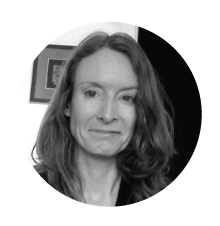
Colleen recently completed a PhD in information science, looking at the ways in which people perceive and respond to health information. She loves yoga, Pilates, jasmine tea, and her little cat Summer.
By Katalina Bernards
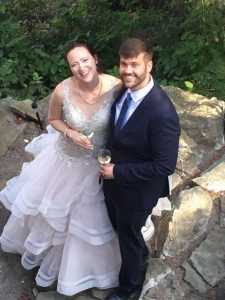 On July 21st, 2018, surrounded by the natural beauty of Bowen Island, BC, I stepped out into the sunshine to marry the love of my life. It was a beautiful, happy, playful, perfect day; we were surrounded by the people we love, and who love us in return - and my past eating disorder was absolutely nowhere to be seen.
On July 21st, 2018, surrounded by the natural beauty of Bowen Island, BC, I stepped out into the sunshine to marry the love of my life. It was a beautiful, happy, playful, perfect day; we were surrounded by the people we love, and who love us in return - and my past eating disorder was absolutely nowhere to be seen.
Not that this came as a real surprise – I've put in the work to recover, and I no longer have to consciously think about choosing what's healthy and right for me. It's intuitive, and I'm so much stronger for that. But what I didn't realize until just a few days ago was how much of a role my recovered mindset played in the actual planning and execution of my wedding. With so many horror stories out there of how stressful, expensive, and high-maintenance planning a wedding can be, I was initially a little anxious about what could go wrong for us: What if I spiral out of control into a full-on Bridezilla worthy of the trashiest reality TV drama???
But I didn't. All of the same tools and strategies I had incorporated into my recovery over the years played into the way I approached my wedding, which led to me being able to be fully present in each and every moment of this truly wonderful, cherished experience.
All of the same tools and strategies I had incorporated into my recovery over the years played into the way I approached my wedding, which led to me being able to be fully present in each and every moment of this truly wonderful, cherished experience.
Here are some of the things we did that helped my husband and I stay focused, present, and happy as we planned our big day:
 Did everything go absolutely perfectly, without a single hitch? Of course not. There were snags, there were plans and to-do items that did not come to fruition, and last-minute hiccoughs that we didn’t see coming. But did any of it matter? No, not really. We adapted, we laughed and took it all in stride, and we stayed focused on the important things. And if we had allowed ourselves to get tangled up in stressing over the small stuff, we would have missed out on some amazing opportunities to be totally spontaneous: We suddenly decided to improvise a first dance (we were going to skip it completely); I provided silly play-by-play commentary for a game of Giant Jenga; and my husband and I got to perform onstage together for the first time ever (he’s a professional musician, and I… well, I sing in the shower). Without these sweet moments of pure and joyful abandon, our day would not have been as memorable as it is now.
Did everything go absolutely perfectly, without a single hitch? Of course not. There were snags, there were plans and to-do items that did not come to fruition, and last-minute hiccoughs that we didn’t see coming. But did any of it matter? No, not really. We adapted, we laughed and took it all in stride, and we stayed focused on the important things. And if we had allowed ourselves to get tangled up in stressing over the small stuff, we would have missed out on some amazing opportunities to be totally spontaneous: We suddenly decided to improvise a first dance (we were going to skip it completely); I provided silly play-by-play commentary for a game of Giant Jenga; and my husband and I got to perform onstage together for the first time ever (he’s a professional musician, and I… well, I sing in the shower). Without these sweet moments of pure and joyful abandon, our day would not have been as memorable as it is now.
As I stepped out in my wedding gown in front of our smiling, supportive, loving friends & family, I felt more than ever the absolute freedom that recovery has given me – and I was so grateful to have left my old ED off the guestlist.

Katalina is the Volunteer & Program Manager at the Looking Glass Foundation, and holds a degree in Psychology from Simon Fraser University. She loves live music, theatre, writing, and singing when no one is listening.
By Maja Kostanski
Stepping into the counselling office at my university at age 22, was one of the best decisions I have ever made. It was April, there was a warm breeze in the air, and signs of spring were blooming their way out of the ground. I was ending my 2nd year at university, which meant exams were looming and I was feeling completely burnt out and exhausted. Not only was my course load particularly difficult for me that year – filled with Calculus and Organic Chemistry, but my eating disorder, which I thought I had left behind years prior, was still very much present and seemed to be showing up more and more. I was struggling with binge eating disorder and exercise addiction and the stress of exams along with the pressure of the upcoming summer season, was amplifying my disorder to a point where I couldn’t face it alone any longer.
[dt_quote type="pullquote" layout="right" font_size="big" animation="none" size="1"]It was the beginning of a journey that was leading me to a much healthier and happier place.[/dt_quote]
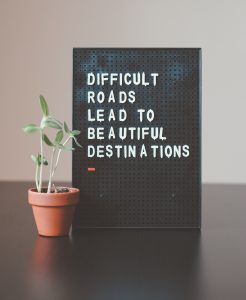 The conversation with the university counsellor at my very first counselling session is now a distant blur because it was almost 8 years ago, but I do remember it being full of tears, emotions, difficult moments and ultimately relief, like a weight had lifted off my shoulders. It was the beginning of a journey that was leading me to a much healthier and happier place. Here are four reasons why walking into the counselling office on that warm April day was one of the best decisions I ever made:
The conversation with the university counsellor at my very first counselling session is now a distant blur because it was almost 8 years ago, but I do remember it being full of tears, emotions, difficult moments and ultimately relief, like a weight had lifted off my shoulders. It was the beginning of a journey that was leading me to a much healthier and happier place. Here are four reasons why walking into the counselling office on that warm April day was one of the best decisions I ever made:
1 - Counselling was the catalyst for my recovery from my binge eating disorder and exercise addiction. The university counselling office ended up referring me to a counsellor who specialized in eating disorders and had an office much closer to where I lived. I did several sessions with her and for the first time I opened up about many life events that I had been harbouring inside for too long. The sessions weren’t an immediate, magic fix to my disorder (that doesn’t exist) but they encouraged me to continue to do personal reflection, education and work, even when the sessions were over. It was this combination of counselling, my commitment to putting in work on my own time, and support from my loved ones, which led to my recovery.
2 - I have learned that asking for help is not only okay, but also necessary, and doesn’t have to be a one-time deal. Although I have been recovered from an eating disorder for many years, other things such as relationship issues, career indecision and anxiety have come up in the past 8 years. Having already gone through counselling for my eating disorder, I felt at ease reaching out for help again for these other issues. Going to counselling isn’t something to be ashamed of, it’s something to be proud of because asking for help can be difficult, and it means you are taking steps to take care of yourself and reach your full potential. I currently have a fantastic counsellor that I see a few times a year and it is comforting to know that I can book a session when I feel I need it.
3 - Counselling equips me with practical tools to keep in my tool belt. Not only can counsellors provide an ear for listening, but they also have a wealth of tools, resources and information to share that are pertinent to specific disorders and issues. My current counsellor always writes down mental exercises for me to practice and has provided me with helpful online links where I can educate myself even more on the things I am going through. This means that even once I leave the counselling session, I can feel confident knowing I have the tools and resources at my fingertips that I can turn to, which is particularly useful on difficult days. I use techniques such as meditation, deep breathing, and journaling on a regular basis and they truly make a difference in my overall well-being.
4 - I am now an advocate for counselling and encourage others to seek the help they need. It is a wonderful gift to be able to share my experience with counselling and the benefits it has for me. Perpetuated by the stigma of mental health that is ongoing in our culture and society, there is a still a sense of shame with eating disorders, and many mental illnesses for that matter. This shame can make it challenging for a person with an eating disorder to ask for help. I feel that the power of sharing personal experiences can make a big difference, especially if there is a whole community echoing the same message.
 Eating disorders, and other mental illnesses, can be very challenging which means that putting our mental health first sometimes requires the help of caring professionals. I am here to tell you that reaching out for help makes you a stronger person. Everyone’s recovery journey will be different and may involve different forms and combinations of therapies and treatments. Counselling may not be the best fit for you, but it is worth trying and finding out for yourself. You may end up forming your own reasons for how counselling helps you! If the cost of counselling is holding you back, know that many schools, colleges and universities offer free counselling services, and there are also many private counsellors who can offer sessions at a sliding scale. Also, you may not connect with the first counsellor you see and that is okay. Do not be afraid to search for a counsellor that you feel you can truly open up to or that specializes in the issue you are going through.
Eating disorders, and other mental illnesses, can be very challenging which means that putting our mental health first sometimes requires the help of caring professionals. I am here to tell you that reaching out for help makes you a stronger person. Everyone’s recovery journey will be different and may involve different forms and combinations of therapies and treatments. Counselling may not be the best fit for you, but it is worth trying and finding out for yourself. You may end up forming your own reasons for how counselling helps you! If the cost of counselling is holding you back, know that many schools, colleges and universities offer free counselling services, and there are also many private counsellors who can offer sessions at a sliding scale. Also, you may not connect with the first counsellor you see and that is okay. Do not be afraid to search for a counsellor that you feel you can truly open up to or that specializes in the issue you are going through.
I still get blown away with each session I go to because I always come out of it learning something new about myself, about the world around me, or about the fascinating world of psychology. For me, each session is a transformative and enlightening experience that helps me gain confidence and clarity, and most importantly reminds me that I am human and to be kind to myself. To all my past, current and future counsellors, thank you.

Maja is the Communications Coordinator at the Looking Glass Foundation, and holds a Bachelor of Science in Food, Nutrition and Health from the University of British Columbia and a Digital Marketing Certificate from Simon Fraser University. When she isn't working, you can find her mountain biking, hiking or running in the trails with her energetic dog.
We are thrilled to announce the selection of Susan Climie as our new Executive Director. She officially began her new role on July 23rd, 2018.
“The Looking Glass Foundation Board is delighted to have Susan join our team as Executive Director after an exhaustive search process,” said Debbie Slattery, Board Chair. “Susan is empathetic, well spoken, thoughtful, intelligent and prepared. We feel confident that Susan will successfully achieve the goals of LGF to provide leadership, management and financial success in support of our mission and vision.”
Susan comes to the Looking Glass Foundation with over 15 years of non-profit and leadership experience gained from her roles as the National Director of Training for Big Brothers Big Sisters of Canada and as Interim Executive Director and Director of Development for Big Sisters of BC Lower Mainland. She has also served as Director of Development for Family Services of Greater Vancouver and worked as a governance consultant dedicated to enhancing organizations’ governance, operations, fundraising, and strategic partnerships.
“LGF is a critically important organization,” said Susan Climie. “Eating disorders are still misunderstood by many, and there is such a great need for services for those struggling with this mental illness. Addressing the multi-dimensional aspects of eating disorders is so important, as mental, social and physical health all play a role in the disease.”
When asked what she was most looking forward to in her new role, Susan said, “Getting to know the experienced staff and Board members, hearing the stories of those who participate or volunteer in our programs, and working as a team to enhance the sustainability and impact of the organization. I am also looking forward to connecting with our dedicated donors and expanding our donor community.”
Susan holds a BA in Political Science from the University of British Columbia and an MBA from Western University. She has also completed the Rotman Institute for Corporate Directors Not For Profit Governance Course.
Please join us in welcoming Susan to the Looking Glass Foundation community!
By Kaela Scott
The start of summer always feels so uplifting. The days are long, sunshine boosts our mood and it promises days filled with many wonderful outdoor and social activities. While we know that summer can be tricky for those who struggle with eating disorders, even those who struggle often report that summer makes them feel better and lifts their spirit. However, what I often notice in my line of work is that with all the benefits that summer brings, it often has one major cost: Burnout. Burnout is what happens when we burn the candle at both ends and the stress from doing so physically, mentally and emotionally exhausts us. It has an impact on our overall wellbeing and makes typical engagements feel arduous and unfulfilling. During the summer months, it is not uncommon for people to overschedule themselves in ways that can leave them feeling depleted and that can make focusing and working on recovery really difficult.
 By the time August hits, people have been pushing themselves hard in many great, but not always healthy, ways. Longer days means less downtime with a cup of tea, and the warm weather can often result in people being more active and not listening to their body’s need for rest. Summer is also a time when people often socialize more which is wonderful but can be draining, especially when so much of socializing is based around food – a big anxiety trigger for many struggling with an eating disorder. We know that as our anxiety climbs, our destructive eating disorder behaviours often climb alongside. One of the trickiest things about this time of year is often we can feel both motivated and pressured to take part in the many things going on, making it more difficult to say no to things that don’t necessarily serve us.
By the time August hits, people have been pushing themselves hard in many great, but not always healthy, ways. Longer days means less downtime with a cup of tea, and the warm weather can often result in people being more active and not listening to their body’s need for rest. Summer is also a time when people often socialize more which is wonderful but can be draining, especially when so much of socializing is based around food – a big anxiety trigger for many struggling with an eating disorder. We know that as our anxiety climbs, our destructive eating disorder behaviours often climb alongside. One of the trickiest things about this time of year is often we can feel both motivated and pressured to take part in the many things going on, making it more difficult to say no to things that don’t necessarily serve us.
So what do I recommend in order to make the most of your summer without feeling completely and utterly burnt out?
 It can be hard to miss out on some of the things that are happening, especially when they are things you enjoy, but neglecting yourself in the name of fun doesn’t make it less harmful. Instead, try to find a balance so that you can both enjoy your summer while also taking care of yourself. Recovery in so many ways is a full-time job and while it is important to sometimes put it to the side and go have some fun, it is also important to acknowledge what you need in order to feel and be well.
It can be hard to miss out on some of the things that are happening, especially when they are things you enjoy, but neglecting yourself in the name of fun doesn’t make it less harmful. Instead, try to find a balance so that you can both enjoy your summer while also taking care of yourself. Recovery in so many ways is a full-time job and while it is important to sometimes put it to the side and go have some fun, it is also important to acknowledge what you need in order to feel and be well.
Recovery in so many ways is a full-time job and while it is important to sometimes put it to the side and go have some fun, it is also important to acknowledge what you need in order to feel and be well.
Summertime is one of the best times of the year so get out and enjoy it but make sure to carve out some downtime each day or week to maintain your sense of balance and to ensure you don’t deplete yourself.
 Kaela Scott is a Registered Clinical Counsellor who specializes in Eating Disorders. She runs her own private practice and works with the Looking Glass Foundation in both their summer camp and their Hand In Hand Program. She has been passionate about working with eating disorders since freeing herself from her own struggle and realizing what it is like to be happy and well. When she isn’t working, you can find Kaela either cozying up with a cup of tea and her friends or up in the mountains going for a hike.
Kaela Scott is a Registered Clinical Counsellor who specializes in Eating Disorders. She runs her own private practice and works with the Looking Glass Foundation in both their summer camp and their Hand In Hand Program. She has been passionate about working with eating disorders since freeing herself from her own struggle and realizing what it is like to be happy and well. When she isn’t working, you can find Kaela either cozying up with a cup of tea and her friends or up in the mountains going for a hike.
By Jenna Spowart
My recovery journey began six years ago. I admitted to myself that I had an eating disorder. I told my parents that I needed help. I asked my best friend to look online for treatment options. Before long I was walking up the front steps of Woodstone Residence (now Looking Glass Residence). This was the first time I chose recovery.
 Since then, I’ve chosen recovery time and time again. I created meal plans during both stressful school semesters and unstructured summer vacations. In order to fight through anxiety and nausea triggered by a car accident, I scheduled regular checkups with my doctor. After losing a dear friend to suicide I grappled with concepts of life and death, ultimately choosing life and recovery for myself. These are extreme examples, but there are subtler ones as well.
Since then, I’ve chosen recovery time and time again. I created meal plans during both stressful school semesters and unstructured summer vacations. In order to fight through anxiety and nausea triggered by a car accident, I scheduled regular checkups with my doctor. After losing a dear friend to suicide I grappled with concepts of life and death, ultimately choosing life and recovery for myself. These are extreme examples, but there are subtler ones as well.
There are times I have felt anger without punishing my body. I have been exhausted and still made time for breakfast. I have eaten Christmas cookies and still allowed myself a delicious Christmas dinner. I have intentionally decided not to step on the scale. I’ve caught glimpses of myself in the mirror and attempted to gaze at my reflection instead of turning away in disgust. I’ve agreed to see a therapist. However, there have also been several moments, days, and weeks that I have neglected healing and health, instead succumbing to the deadly grasp of addiction and well-worn destructive neural pathways.
As I continue to trudge through seasons of extreme set backs, I’ve found myself wondering if the act of simply choosing recovery isn’t enough. This season has been confusing, frustrating, and exhausting. I’m tired of therapy appointments and the emotional hangovers. I’m tired of tear-induced headaches. I’m tired of fighting because it seems like I’ll never get to where I’m trying to go.
This past week in therapy, however, was a game changer. Although I spent the hour drowning in apathy and feeling disconnected from myself, it has proven to be one of the most important hours of my life. Although I don’t recall much of what we talked about, I do remember that my therapist would not let me leave her office until I returned to my body and made a conscious decision about what I was going to do with my evening. She surprised me when she said:
“You can decide to choose self love tonight, or you can choose self destruction, but either way your decision needs to be a conscious one.”
Before I left her office, I decided to choose recovery. I wasn’t committing to forever or even all week, but just for the night. And to my surprise, it worked. How was it possible that I could take care of myself after a week full of setbacks and what seemed like a useless therapy appointment?
[dt_quote type="pullquote" layout="right" font_size="big" animation="none" size="1"]I learned that choosing recovery is enough. But I have to choose it all the time. I need to choose it in times of strength so that when challenges arise I have already committed to recovery.[/dt_quote]

I learned that choosing recovery is enough. But I have to choose it all the time. I need to choose it in times of strength so that when challenges arise I have already committed to recovery. I find it helpful to sit down with my journal each morning and write down what I choose to commit to that day. Sometimes I need to text a friend for the sake of accountability. Additionally, I’ve realized that I need to recommit to choosing recovery when I get home from work. I’m trying to make a habit of doing this before I get out of my car, or at least make it the first thing I do when I get inside.
Recovery is a conscious choice. It is overwhelming and rewarding. It’s exhausting and freeing. It’s daunting and it’s absolutely possible. There is wisdom in every cliché, including the phrase, “One day at a time.” Perhaps we’ve heard this saying so often that its meaning has dissipated over time. It is up to each of us, however, to intentionally choose recovery each and every day, one day at a time.
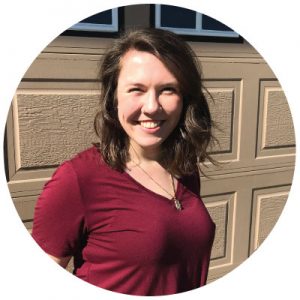 Jenna is a poet, musician, and lover of the outdoors. She holds a BA in Psychology, and hopes to one day support others in their journey of recovery and healing. This desire stems from Jenna’s gratitude toward those who walk alongside her in her own recovery. You can often find Jenna enjoying a strong cup of coffee and connecting with dear friends.
Jenna is a poet, musician, and lover of the outdoors. She holds a BA in Psychology, and hopes to one day support others in their journey of recovery and healing. This desire stems from Jenna’s gratitude toward those who walk alongside her in her own recovery. You can often find Jenna enjoying a strong cup of coffee and connecting with dear friends.
Stacey Huget has fearlessly led the Looking Glass Foundation for 4 years as the Executive Director and for 3 years prior to that, served as a strategic planning consultant. Her passion, resilience and dedication have helped guide the organization through comprehensive operational changes, ground-breaking and community-building campaigns, innovative new program implementation and countless engagements aimed to further the progress, services and advocacy around eating disorders.
We sat down with Stacey to get her reflections about her time at LGF, her insights into the opportunities for the eating disorder community, and her vision for the future for mental health as a whole. We are sure her encouraging and bold words will inspire you, as they have unquestionably inspired us.
I was first hired as a consultant by the LGF Board to help them with strategic planning back in 2011. After 3 years of working together, they approached me about becoming the Executive Director. It was only then that I let them know that I myself had struggled with an eating disorder for 22 years -- part of the reason I'd been so passionate about the cause. It seemed like my becoming the ED was even more of a fit after that.
Well, for one thing, when I started, LGF was pretty much a virtual operation run by some very committed Board members who were doing amazing things -- but there was no office, no staff, no systems, no promotional material, no real strategy. Building up the LGF as we know it today was an enormous challenge, and I'm definitely proud of my part in that.
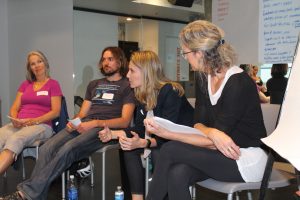 Another thing I'm proud of is how we've doubled the LGF community to over 6,000 organizations and individuals, including a network of nearly 900 volunteers -- many of whom are themselves past eating disorder sufferers and are now ambassadors for the fight against this disease. Community is so pivotal to who we are and what we do. As an organization, the "hill we're prepared to die on" has always been the struggle of those who suffer. By growing our community of support, we're growing the critical mass of voices defending that hill with us.
Another thing I'm proud of is how we've doubled the LGF community to over 6,000 organizations and individuals, including a network of nearly 900 volunteers -- many of whom are themselves past eating disorder sufferers and are now ambassadors for the fight against this disease. Community is so pivotal to who we are and what we do. As an organization, the "hill we're prepared to die on" has always been the struggle of those who suffer. By growing our community of support, we're growing the critical mass of voices defending that hill with us.
I'm also proud of our team's success in launching several new support programs, including Hand in Hand, which has huge potential as an innovative community-based model of recovery support. And, of course, our Something’s Gotta Give campaign and short film series (SGG) -- which engaged and gave voice to the national ED community around the more systemic barriers to overcoming this disease -- was a pretty massive undertaking. We hope SGG will help to move us forward as a community.
I’d like to see us give more of a voice to the people with lived experience of this illness, because I don’t think they're heard as much as they need to be. As we did in SGG, I'd like us to encourage them to do more than tell their own stories ... to also speak out about the bigger things they think need to change if we're going to beat this disease.
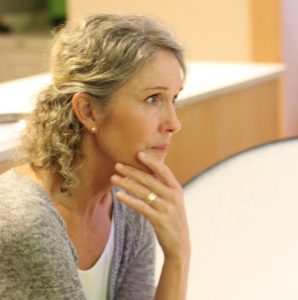
One thing I would like us to achieve is a better positioning of eating disorders within our society's larger conversation about mental health. Eating disorders are such a good flashpoint for dialogue insofar as so many sufferers also experience anxiety, depression, addiction, self-harm, and other mental health issues.
I'd also like for us to critically address the way we allocate funding, support research, encourage innovation around treatment approaches, and introduce education and social policies that advance better mental health in our society in general.
In all of that, I’d like to see us give more of a voice to the people with lived experience of this illness, because I don’t think they're heard as much as they need to be. As we did in SGG, I'd like us to encourage them to do more than tell their own stories ... to also speak out about the bigger things they think need to change if we're going to beat this disease. I think that’s where we’ve been stuck. We keep sharing the heartbreak without getting at the deeper, systemic issues. We occasionally get the attention of those in a position to effect real change, but we're not helping to direct their efforts.
Sadly, there are a lot of gaps. One is the gap in practitioner education. So many healthcare practitioners -- including doctors -- don’t actually understand eating disorders, and yet they're the first line of support for people suffering.
Another is the gap in innovation around treatment approaches and models of program delivery -- so that what's on offer sometimes has more to do with what's convenient or "evidence based" in provider terms rather than what's responsive and effective for the person suffering. There are probably some really creative approaches out there that could be having a great impact, but they don't meet the funding requirements to mount evidence-based studies or they do, but their outcomes aren't being shared across the ED community.
But really, one of the biggest gaps we have is in mindset. However well-intentioned, we can be timid and disorganized when we speak out about eating disorders. Given the sheer numbers of people affected by eating disorders, how rapidly it's escalating, and how early we’re seeing it show up among our kids, we could be more strident and strategic about what we ask for. We could be saying: this is not okay, this is what we need, and this is why it matters -- not as a philanthropic issue but as a social and even economic issue.
SGG was, in part, about encouraging people to rally around the things we most want to see change -- and we launched it about the same time as NIED was approaching the provincial organizations about developing a national eating disorder strategy. We were already out of the gate by the time we all met in Winnipeg in September 2016 but I see now we're beginning to coalesce around many of the same issues -- which is fantastic. We're finally moving away from just raising awareness to addressing more of the key, systemic gaps -- which is what those who hold the purse strings and who write the policy need to be hearing about, and ideally from lots of people. Nothing happens as quickly as one would like, but I'm optimistic that there's a new energy and solidarity emerging.[
My advice would be to the ED community and I'd give it in two words: Be audacious. With all the courage it takes to recover from this disease, how dare we be timid or dream small?
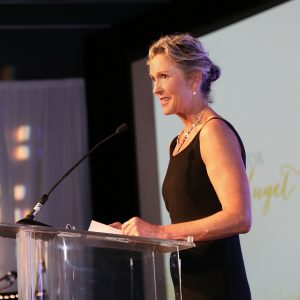
Oh gosh, there are SO many times I've been moved and inspired and amazed by people in this community -- from the courage of those who are suffering, to the passion of volunteers, to the generosity of donors.
One moment I'll always remember was in February of 2016 when we hosted the SGG Rally at the Vancouver Public Library. The room we'd rented was huge, and although we had invited people from our community, the public, and the press -- we really didn't know how many people would actually come. It was a courageous thing we asked people to come and do: to share their stories and their ideas for change in front of other people, and in some cases to even be filmed doing it. It really was such a big ask, and we were terrified that people weren't going to show up and the whole thing would be a humiliating flop. Well, within about an hour the place was standing room only and there was Global TV, CBC, and some of the print press as well, and the noise level was incredible. The energy in the room was absolutely amazing, and it lasted all day long. But it goes to show: If you invite people into a safe space and earnestly invite them to share their experiences and their thoughts about change -- they will.
More than anything, I’ll miss the people I work with. We've locked arms through some pretty intense times, pushed and supported one another, and always delivered our best effort. That kind of dedication and heart is a pretty special thing.
Of course, it goes without saying I’ll also miss the many, many sufferers and volunteers and donors I've gotten to know over the years. It's been a real privilege to experience their humanity, and I’ll carry their magic with me as I go.
I've been so blessed in my career. I spent time in the corporate world, had a consulting practice in the education, wellness, and non-profit sectors, and served as Executive Director for four organizations. Now that I'm in my 50s, I've been reflecting on what I most enjoy doing and where and how I might have the greatest impact over the next couple of decades.
Given my own history with depression, anxiety, an eating disorder, and alcoholism -- mental health is something I am deeply passionate about. I have a certain amount of credibility around these issues as a sufferer, as an administrator, and as someone involved in advocacy -- but not as someone who has credentials on the therapy side. I've been enrolled in counselling on a part-time basis for a while now and am going to go back to school full-time in the Fall to complete the final year of my accreditation. After that, my plan is to go back into consulting with a focus on holistic mental health advocacy, facilitation, and counselling ... but I'm open to whatever the universe has in store.
My advice wouldn't so much be for the new Executive Director as I'm certain she'll have an amazing impact of her own making. My advice would be more to the ED community and I'd give it in two words: Be audacious. With all the courage it takes to recover from this disease, how dare we be timid or dream small?
By Maja Kostanski
**TRIGGER WARNING: If you live with or are in recovery from an eating disorder, the following post could potentially be triggering.**
You may have seen the hashtag #WakeUpWeightWatchers blowing up on social media a few months ago when Weight Watchers announced that this summer, they will be offering a new family-oriented wellness program which offers their services at no cost to teenagers ages 13-17, as long as they sign up with a parent. Immediately following their announcement came a flood of criticisms against the program from health professionals, eating disorder foundations, and the public.
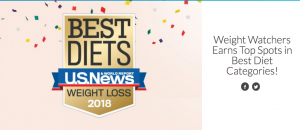 WW claims that their programs aren’t diets. Instead they call them “lifestyle-change programs.” But when they were recognized in the 2018 Best Diet rankings, they seemed to have no hesitation with issuing a press release and slapping “Best Diet” all over their website. So for the sake of this blog, I will refer to their programs as diets, because ... well, they do.
WW claims that their programs aren’t diets. Instead they call them “lifestyle-change programs.” But when they were recognized in the 2018 Best Diet rankings, they seemed to have no hesitation with issuing a press release and slapping “Best Diet” all over their website. So for the sake of this blog, I will refer to their programs as diets, because ... well, they do.
If you haven’t heard about the how WW diet works, then here’s the low-down: Every food and drink has a point value assigned based on calories, fat, sugar and protein. Each client is assigned a “budget” that allows for a certain amount of points to be consumed each day. If someone is active then they get “FitPoints” which essentially allows them to get more points towards food and drink. Clients can decide whether they participate only online, or also attend meetings where they discuss progress or struggles. Weight Watchers is known to start each new client by weighing them on a scale, and tracking their weight throughout their time on the WW diet.
 So if this is how their traditional programs for adults function, what would it look like for teenagers? Well, Weight Watchers hasn’t fully answered that question other than a tweet back in February that said, "We have and will continue to talk to healthcare professionals as we get ready to launch this program." I find it fascinating that since then, they have posted no updates about the program on social media or on their website. I am curious - what did the healthcare professionals have to say? Which healthcare professionals did you talk to? Where is the accountability?
So if this is how their traditional programs for adults function, what would it look like for teenagers? Well, Weight Watchers hasn’t fully answered that question other than a tweet back in February that said, "We have and will continue to talk to healthcare professionals as we get ready to launch this program." I find it fascinating that since then, they have posted no updates about the program on social media or on their website. I am curious - what did the healthcare professionals have to say? Which healthcare professionals did you talk to? Where is the accountability?
The only other information to be found was on their UK site which stated that, “As a young person (between the ages of 13 and 18) we are happy to welcome you to Weight Watchers meetings as long as you are accompanied by a parent or guardian and you have written permission from your doctor.” It also states that, “Your SmartPoints budget depends on your age and gender and will be given to you by your Weight Watchers Coach”, which means that both adults and teens will follow the traditional point program.
There are many opinions both for and against their teen program. Due to my own experience with dieting at a young age and where it led, and because of the statistics on dieting and eating disorder correlations, I say that WW is not a diet that teens, or, for that matter, adults should turn to.
Weight Watchers claims that the program is meant to foster "the development of healthy habits at a critical life stage." Yes, the teenage years are a critical life stage and yes teens should be developing healthy habits, but the WW point system is not the way to do that. Proper health and food practices should not involve tracking calories, points, or any numbers, because those practices have the potential to start an unhealthy obsession with overthinking food choices or restricting due to set rules.
When I look back on my journey during my eating disorder, one of the things I regret the most was the time and energy I put into overthinking everything around food and exercise. The WW system is setting teenagers up to do the same - they simply label it in a different way.
At age 15, I started dieting mainly through counting calories and restricting certain foods. By age 16, I developed atypical anorexia nervosa, and by age 18 the restriction led to 6 years of binging and over-exercising. When I look back on my journey during my eating disorder, one of the things I regret the most was the time and energy I put into overthinking everything around food and exercise. The WW system is setting teenagers up to do the same - they simply label it in a different way. From a recovery perspective, a more successful approach involves an intuitive eating mindset. The major piece to intuitive eating is rejecting the diet mentality, adopting an “all foods fit” mantra, and honoring hunger cues. Intuitive eating encourages us to challenge the rules we may have around food, and to learn as we go what feels best for our own unique, individual needs and bodies.
In addition to the unhealthy practice of tracking points while ignoring the possibility of underlying mental health issues or eating disorders is the fact that 95% of diets fail, causing people to fall into the weight loss trap and making them feel that they failed, when in reality the diet was set up to make them fail. We’ve already established that WW is a diet, not a lifestyle program. We also know that there is a correlation between dieting and eating disorder onset. Statistics tell us that “Girls aged 14-15 who engaged in strict dieting practices were 18 times more likely to develop an eating disorder within six months than non-dieters, and had almost a 20% risk of developing an eating disorder within one year.” Even girls who had dieted moderately were five times more likely to develop an eating disorder within 6 months than non-dieters. Maybe some wouldn’t say WW is strict dieting, but it would definitely be considered dieting moderately. Whichever way it is labeled, according to statistics, the teen program WW is offering is fraught with challenges and risks to the very population they are trying to help.
It is also important to consider all types of eating disorders in this equation. Binge Eating Disorder (BED) is sometimes overlooked, but it is a serious eating disorder that involves compulsive overeating or consuming abnormal amounts of food while feeling unable to stop and at loss of control. BED typically results in weight gain, and a teenager or adult suffering from BED could easily find themselves in a WW office thinking that if only they could control their food intake then they wouldn’t binge. However, BED, like any other eating disorder, is often caused by underlying emotional issues that have not been dealt with properly, and the help individuals should be seeking is that from counsellors and psychologists. If these underlying issues are not addressed, a diet will simply be a temporary solution with the individual likely to re-engage in disordered eating behaviours as soon as they are faced with emotional or life challenges.
So, where should young teens get their health and food information from?
I really like this question because it can be a challenging topic and is therefore important to address. If a teenager is struggling by not eating enough or eating too much, they could either be lacking knowledge about healthy eating, cooking and sustainable nutrition habits; they could be suffering emotionally for various reasons causing them to turn to or away from food; they could be struggling with an eating disorder; or it could be a combination of various factors.
 For those who need guidance on nutrition, the whole family should become involved to help build healthy skills and habits for future success. Families could benefit from working with a dietitian to help plan meals, get new recipe ideas and become confident in their food choices. I also think that schools should get guidance from dietitians and healthcare professionals to provide education around food literacy in an environment where teens spend a lot of their time.
For those who need guidance on nutrition, the whole family should become involved to help build healthy skills and habits for future success. Families could benefit from working with a dietitian to help plan meals, get new recipe ideas and become confident in their food choices. I also think that schools should get guidance from dietitians and healthcare professionals to provide education around food literacy in an environment where teens spend a lot of their time.
Lastly, some argue that WW is just trying to offer solutions to the teenage obesity crisis. There are likely people in the company who have good intentions for this program and I am sure they care about the well-being of teens, but from a business standpoint it appears that WW is trying to capture a new population that they have never reached before. And if they can hook teenagers ages 13-17, come age 18 they suddenly have a paying customer. Weight management is a steadily growing market in Canada, and in 2012 reached a value of $189 million while sales of health and wellness smartphone apps total an estimated $1.3 billion. WW is trying to gain more of a market share. Let’s call it as it is.
Weight Watchers is here to commodify a fresh market that is driven by insecurity, so our goal should be to address that insecurity early on and focus on building resilience and confidence in teenagers – not on putting them on diets.
We should also take note that a diet program like Weight Watchers rarely asks the fundamental question, “Why are you concerned about your weight?” and even if they do, I would question whether they really care about the answer. When it comes to teens, who are in a critical stage of development where they are learning thoughts and behaviour patterns that can easily become lifelong habits, the answer to this question really matters – as adults, our bodies will only continue to morph and change over time, so it is crucial that we act today to emphasize messages of self-acceptance, body positivity, empowerment, self-worth, and happy aging over and above messages that promote a culture of food and body weight obsession at every age. WW is here to commodify a fresh market that is driven by insecurity, so our goal should be to address that insecurity early on and focus on building resilience and confidence in teenagers – not on putting them on diets.
The solution to teenage obesity or teenage body image and weight issues might not be simple, but it is definitely not turning to Weight Watchers. Instead, we should teach teenagers how to approach food intuitively and make good choices without the need to obsessively track each meal. Food literacy and positive body image should be taught at home, in schools and via media. Mental health issues such as eating disorders, if possible, should be addressed at an earlier age with the intervention of counselors and healthcare professionals.
Since Weight Watchers started facing the backlash for opening its doors to teenagers, they seem to have silenced their media around this teen outreach program, which is fascinating in itself, although it is clear they are offering it in some countries according to the (very difficult to find) information online. If Weight Watchers doesn’t #WakeUp, I hope that society, parents and teenagers do wake up and realize that there are far more sustainable approaches to eating, and that the quick fixes offered by countless weight loss and diet companies will never be the real solution.

Maja is the Communications Coordinator at the Looking Glass Foundation, and holds a Bachelor of Science in Food, Nutrition and Health from the University of British Columbia and a Digital Marketing Certificate from Simon Fraser University. When she isn't working, you can find her mountain biking, hiking or running in the trails with her energetic dog.
[vc_row][vc_column][vc_column_text][printfriendly]
By Kaela Scott
Q: I love my job and my coworkers are lovely people, but every non-work conversation is fixated on weight loss, dieting, fitness, and the latest health trends. I’m a 47-year-old woman who has worked hard to recover from a lifelong eating disorder, and these conversations are challenging for me to hear. What can I do to show them how toxic their obsession is, without having to tell everyone about my eating disorder?

A: This is a really great question and something I think many people of all different ages can relate to. It is a sad reality that food and body are always hot topics for conversation in the world we live in and that often these conversations aren’t particularly healthy or focused on genuine confidence and wellbeing. When going through recovery these conversations are bound to be triggering but I think the big thing to focus on when overhearing these discussions is your own anxiety and feelings.
[dt_quote type="pullquote" layout="right" font_size="big" animation="none" size="18"]It is natural to want to educate people on how destructive the diet and fitness industry can be and to want to show them the “healthier” way. The challenge is that it isn’t our job to correct people’s beliefs or to tell them how they need to live their lives.[/dt_quote]
It is natural to want to educate people on how destructive the diet and fitness industry can be and to want to show them the “healthier” way. This is especially true when someone has committed months or even years to focusing on recovery and has invested a lot of effort and commitment into having a healthy relationship with food and their body. The challenge is that it isn’t our job to correct people’s beliefs or to tell them how they need to live their lives. Instead, it is our job to learn how to remove ourselves and regulate when we feel triggered or angry by other people’s conversations or behaviors.

When we recover we so often believe and hope that our journey is done, that we will no longer have to focus so hard on regulating our anxiety and emotions around food, exercise, people and other triggers. Having worked so hard for this we can feel even more overwhelmed when something challenges our newfound strength. Even when recovered, some conversations can be hard to hear. While this is really difficult, it is also part of the world we live in and something we have to accept. This isn’t to say that we shouldn’t try to have a positive influence on those we surround ourselves with, rather that we need to decide where to pick our battles. In our friendships, it can be normal to set boundaries around the types of conversations we find helpful vs. harmful because we spend a lot of our free time with these people and need to feel safe to feel close. With work colleagues, however, the nature of our relationship is professional and it isn’t our job to have everyone share the same beliefs or to limit conversation.
Our environment will often have lots of really healthy and inspiring people and things in it, but it will also have the opposite. We do not get to have control over others, only ourselves. So if you find yourself in the middle of a triggering conversation, choose to remove yourself and focus on what you can do to be okay. The more you learn to regulate, take care of and prioritize yourself, the easier you will find it to live a recovered life in an often unrecovered world.
[/vc_column_text][/vc_column][/vc_row][vc_row][vc_column][vc_column_text]
[/vc_column_text][/vc_column][/vc_row][vc_row][vc_column][vc_column_text]
[dt_divider style="thin" /]
 Kaela Scott is a Registered Clinical Counsellor who specializes in Eating Disorders. She runs her own private practice and works with the Looking Glass Foundation in both their summer camp and their Hand In Hand Program. She has been passionate about working with eating disorders since freeing herself from her own struggle and realizing what it is like to be happy and well. When she isn’t working, you can find Kaela either cozying up with a cup of tea and her friends or up in the mountains going for a hike.
Kaela Scott is a Registered Clinical Counsellor who specializes in Eating Disorders. She runs her own private practice and works with the Looking Glass Foundation in both their summer camp and their Hand In Hand Program. She has been passionate about working with eating disorders since freeing herself from her own struggle and realizing what it is like to be happy and well. When she isn’t working, you can find Kaela either cozying up with a cup of tea and her friends or up in the mountains going for a hike.
[/vc_column_text][/vc_column][/vc_row]